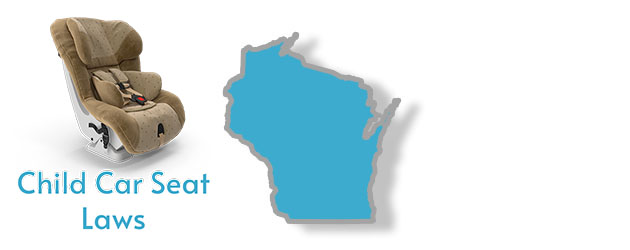A Summary of Child Car Seat Laws in Wisconsin
- Wisconsin law requires children less than 1 year or those who weigh less than 20 pounds to ride on a rear-facing seat.
- Children who are at least 1 year old and weigh 20 lbs., but are under 4 years and weigh less than 40 pounds are allowed to ride on forward-facing seats.
- Wisconsin allows children of ages 4-8 years, who weigh between 40-80 pounds and are shorter than 4’9’’ to ride on booster seats.
- The Wisconsin Department of Transportation recommends children should remain in the back seat until age 13.
Rear-facing Car Seat Laws in Wisconsin
Wisconsin law requires children less than 1 year or those who weigh less than 20 pounds to ride on a rear-facing seat installed in the back seat. However, the AAP (American Academy of Pediatrics) recommends children should stay rear-facing for a minimum of 2 years or until they exceed the manufacturer’s weight and height limits. This is because the rear-facing position is the safest for children. When infants ride forward-facing, their disproportionately large heads can be thrown forward, and this can result in spine and neck injuries in the event of a car crash. A rear-facing seat prevents this by cradling the baby’s head, neck, and spine and also by absorbing most of the impact forces. There are two types of rear-facing seats. Infant-only seats are normally used by newborns and have lower weight limits. Infants usually outgrow them before their first birthday and then switch to convertible seats which have a higher weight limit (up to 40 pounds). Children can use convertible seats until age 4. Remember to recline your child’s seat according to the manufacturer’s instructions.
Forward-Facing Car Seat Laws in Wisconsin
Children who are at least 1 year old and weigh 20 lbs., but are under 4 years and weigh less than 40 pounds are allowed to ride on forward-facing seats installed in the back seat. However, it’s best to wait until your child outgrows the rear-facing requirements before placing him or her in a forward-facing seat. Convertible seats can be turned around to serve as a forward-facing seat. Parents can also opt for combination seats or forward-facing only seats. A seat with a 5-point harness is recommended. This is because the harness straps can be adjusted to fit over the child’s strong shoulders and pelvis. A correctly fitted harness will help in distributing impact forces across the child’s stronger parts in order to protect the child’s fragile parts in the event of an accident. Many car seat manufacturers have designed seats that can support children of up to 65 pounds. This means children can remain forward-facing until age 8, depending on their growth rate.
Booster Seat Regulations in Wisconsin
Wisconsin allows children of ages 4-8 years, who weigh between 40-80 pounds and are shorter than 4’9” to ride on booster seats. Booster seats are used to lift children so that normal vehicle safety belts can fit. For a perfect fit, the shoulder belt should lie low and snug across the center of the chest, and the lap belt should lie flat across the hips and upper thighs. There are two types of booster seats. High-back booster seats provide head support and are much bigger. They can also help in holding the child in place, especially when he or she is napping. Backless booster seats can only be used when the car’s back seats are equipped with headrests. Most booster seats can support children of up to 80 pounds. However, children should be transitioned to safety belts based on their height rather than weight and weight. A height of 4’9” is recommended for safety belts, and most children reach this height between the ages of 8-12 years. Also, a child should be able to sit with his or her back straight against the back of the seat and with knees bent above the edge of the seat without slouching before wearing a safety belt.
Requirements for children to use the front seat in Wisconsin
Wisconsin requires forward-facing seats and rear-facing seats to be installed in the back seat. This means it is not illegal for a child to sit in the front seat once he or she is old enough to ride on a booster seat. However, the Wisconsin Department of Transportation recommends children should remain in the back seat until age 13. This is because the airbags installed in front seats are designed for adults and can injure children when deployed.
Law on leaving a child in a car in Wisconsin
There are no laws regarding leaving a child unsupervised inside a car. However, we do not recommend that you leave your child unattended in a vehicle for any length of time.
Law on Smoking in a car with a child in Wisconsin
There is no law regarding smoking in a car with child passengers. However, we do not recommend that you smoke in your vehicle with a child present.
Car Seat Law Exemptions in Wisconsin
The law clearly states that there are no exemptions allowing the removal of children from restraints to attend to needs such as feeding or diaper change.
Law on Car Seat Replacement in Wisconsin
There are no laws regarding the replacement of car seats. Car seats usually have expiry dates, so be sure to check yours. Also, safety experts say you should replace your car seat after a severe or moderate accident.
More Wisconsin Laws
- Murder Sentencing Guidelines – Minimum to Maximum for Every State (2026)
- Wisconsin Car Seat Laws
- Wisconsin Child Support Laws
- Wisconsin Hit and Run Laws (2026 Guide)
- Wisconsin Lemon Law: Complete Guide for 2026
- Wisconsin Recording Laws
- Wisconsin Sexting Laws (2026 Guide)
- Wisconsin Statute of Limitations
- Wisconsin Whistleblower Laws
